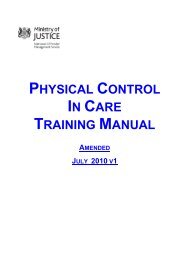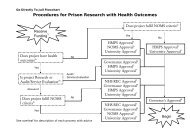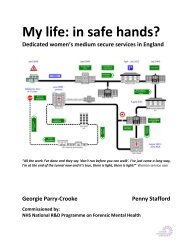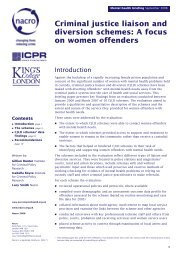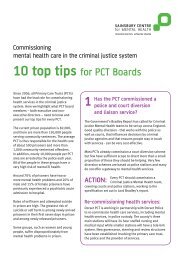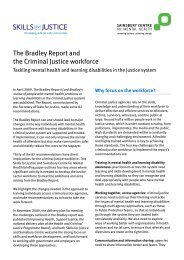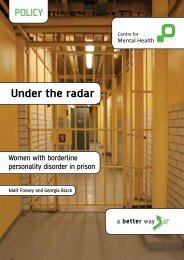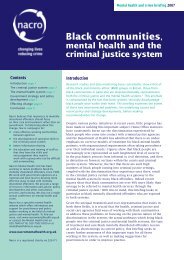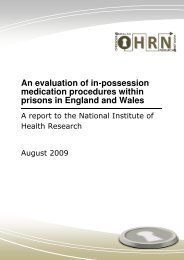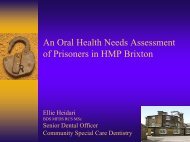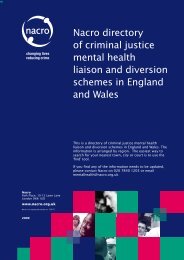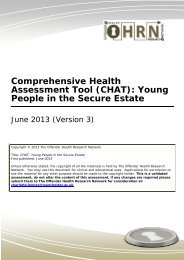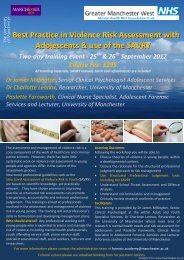Engendering Justice - from Policy to Practice - The Fawcett Society
Engendering Justice - from Policy to Practice - The Fawcett Society
Engendering Justice - from Policy to Practice - The Fawcett Society
- No tags were found...
Create successful ePaper yourself
Turn your PDF publications into a flip-book with our unique Google optimized e-Paper software.
Chapter Four:Women Need <strong>Justice</strong> - Women as Victims of Crimeand moni<strong>to</strong>ring within each of the courts and the sharing ofbest practice. Criminal <strong>Justice</strong> Boards should put in placemechanisms for this moni<strong>to</strong>ring, if responsibility for theSDVCs is devolved <strong>to</strong> criminal justice boards by the CPS asplanned.Despite these improvements, the current conviction rate of68.9% of domestic violence cases recorded by the CPS isstill well below the national average of 85.1% for all casesprosecuted. 152 65.4 percent of DV cases brought <strong>to</strong> theCPS by police in 2007-8 were charged for prosecutionbut there are still significant numbers of domestic violencecases being discontinued after charge. In 2007-08, 27.9percent of cases were dropped, with 21.2 percent of DVvictims retracting their statements. 153Forced Marriage and Honour-based ViolenceSince the previous report of the Commission there havebeen some important developments in relation <strong>to</strong> forcedmarriage and honour based violence and a growing numberof cases are being reported. <strong>The</strong> UK’s joint Foreign &Commonwealth and Home Office Forced Marriage Unit,which was launched in January 2005, dealt with morethan 1,300 cases during the first three quarters of 2008– an increase of 79 percent on 2007. Further, the ForcedMarriage (Civil Protection) Act 2007 came in<strong>to</strong> force on 25November 2008 and provides injunctive relief and damagesfor victims.<strong>The</strong> CPS carried out a pilot in four CPS areas over ninemonths in 2007-08 in which 35 cases were identified. 154This pilot, despite being limited <strong>to</strong> a small number of cases,revealed patterns including that the defendant was malein all cases; the victims were equally likely <strong>to</strong> be maleor female and that it was not unusual for honour-basedviolence <strong>to</strong> occur outside a domestic violence situation. 155A number of key recommendations for future workwere made as a result of this pilot including the need forspecialist prosecu<strong>to</strong>rs and leads, manda<strong>to</strong>ry training forselected prosecu<strong>to</strong>rs, sharing of best practice, and multiagencywork especially with the police. 156<strong>The</strong> Commission welcomes the work of the CPS in thisarea. However, it is important that this initial pilot is followedthrough with the recommended future work, particularlyin relation <strong>to</strong> training and multi-agency working. <strong>The</strong> pilotfindings also noted the need for specific support servicesfor victims, with victim and witness difficulties responsiblefor the majority of unsuccessful outcomes of the small pilotsample. This support needs <strong>to</strong> extend beyond the criminaljustice system <strong>to</strong> the provision of housing, welfare benefitsand publicly funded services such as refuges for victimsfacing forced marriage.TraffickingAs of December 2008, there had been 92 convictions fortrafficking for the purpose of sexual exploitation under theSexual Offences Act and four convictions for traffickingfor labour exploitation. 157 On 17 December 2008, thegovernment ratified the Council of Europe ConventionAgainst Human Trafficking. This is a significant step, withthe Convention setting minimum standards for protectingand supporting trafficking victims. It is important that thegovernment takes its obligations under the Conventionseriously, particularly in relation <strong>to</strong> the support given <strong>to</strong>victims. Currently less than one in ten local authorities hassupport services for women in prostitution. 158This report has already discussed the growing problemin relation <strong>to</strong> the criminalisation of migrant women whoare trafficked in<strong>to</strong> the UK. However, in relation <strong>to</strong> theprosecution of trafficking offences, the vulnerability of thesewomen, and often their families, also needs <strong>to</strong> be taken in<strong>to</strong>account. Eaves <strong>to</strong>ld the Commission of at least one case ofa woman trafficked in<strong>to</strong> the United Kingdom who had familymembers in her country of origin seriously injured as a resul<strong>to</strong>f her giving evidence <strong>to</strong> the police. 159 <strong>The</strong> Commissionwas also concerned <strong>to</strong> learn that there appears <strong>to</strong> be areluctance <strong>to</strong> pursue charges relating <strong>to</strong> trafficking fordomestic servitude or labour exploitation when defendantsare of a high status or wealthy, such as diplomats, whereissues of diplomatic immunity also arise. A coordinatedapproach between the police, CPS and the SeriousOrganised Crime Agency (SOCA) is needed <strong>to</strong> address this.Specialist teams with appropriate training and specificknowledge of trafficking issues and the needs of victimshave the potential <strong>to</strong> make an impact and create confidencein the justice system. For example, the Metropolitan PoliceHuman Trafficking Team was described <strong>to</strong> the Commissionas excellent due <strong>to</strong> their awareness of trafficking issues,willingness <strong>to</strong> take on board advice about women’s needs,Page 56



